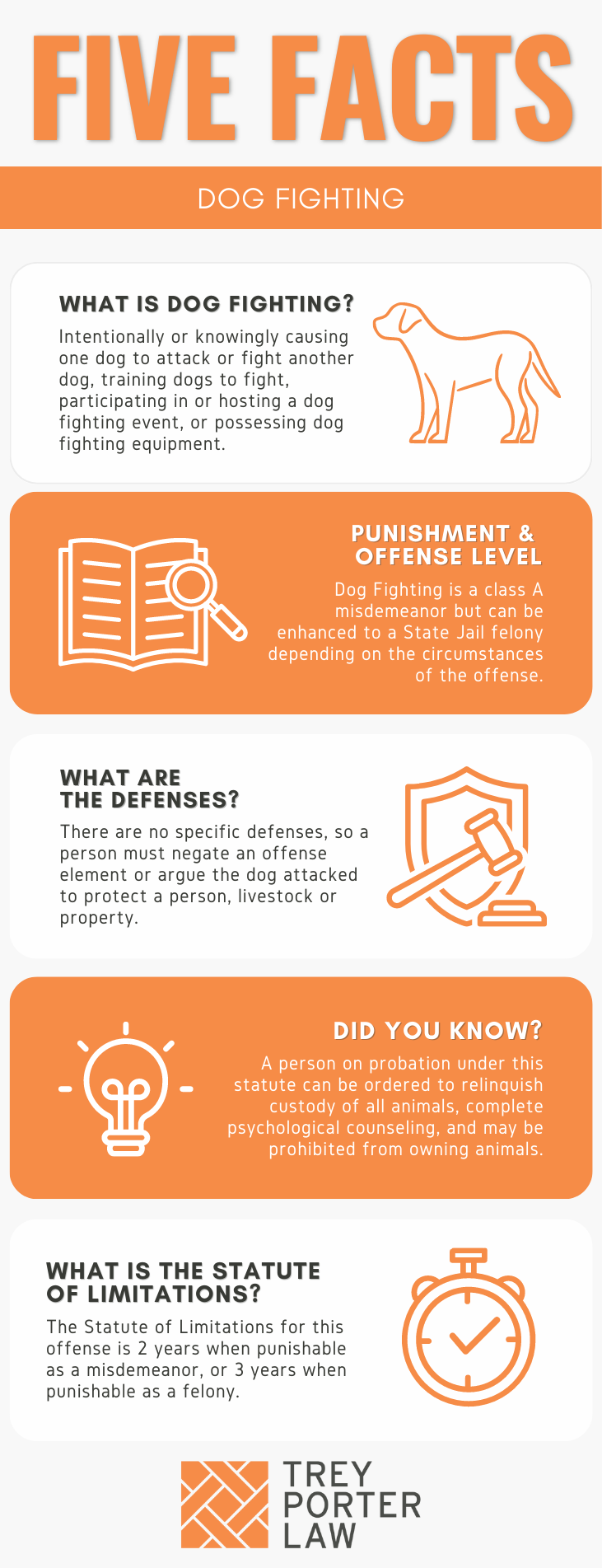WHAT IS DOG FIGHTING IN TEXAS?
The Texas law against dog fighting prohibits intentionally or knowingly causing one dog to attack or fight another dog, participating in or attending a spectating event involving dog fights, training dogs to attack or fight, possessing equipment used to train dogs to fight or in furtherance of dog fighting, and permitting dog fighting on their property.
WHAT IS THE DOG FIGHTING LAW IN TEXAS?
Tex. Penal Code § 42.10. DOG FIGHTING.
(a) A person commits an offense if the person intentionally or knowingly:
(1) causes a dog to fight with another dog;
(2) participates in the earnings of or operates a facility used for dog fighting;
(3) uses or permits another to use any real estate, building, room, tent, arena, or other property for dog fighting;
(4) owns or possesses dog-fighting equipment with the intent that the equipment be used to train a dog for dog fighting or in furtherance of dog fighting;
(5) owns or trains a dog with the intent that the dog be used in an exhibition of dog fighting; or
(6) attends as a spectator an exhibition of dog fighting.
(c) A conviction under Subsection (a)(2) or (3) may be had upon the uncorroborated testimony of a party to the offense.
(d) It is a defense to prosecution under Subsection (a)(1) that the actor caused a dog to fight with another dog to protect livestock, other property, or a person from the other dog, and for no other purpose.
(e) An offense under Subsection (a)(4), (5), or (6) is a Class A misdemeanor. An offense under Subsection (a)(1), (2), or (3) is a state jail felony.
WHAT IS THE PENALTY CLASS FOR DOG FIGHTING IN TEXAS?
Dog fighting may be charged as a Class A misdemeanor or state jail felony, depending on the person’s conduct.
- Class A misdemeanor, punishable by up to one year in county jail, if the offense is committed by:
- owning or possessing a dog with the intent to use the dog in dog fighting;
- owning or possessing dog fighting equipment to train a dog to fight, or in furtherance of dog fighting; or
- attending dog fighting as a spectator;
- State jail felony, punishable by 180 days to two years in a state jail facility, if:
- causing a dog to fight another dog;
- participating in the earnings of or operating a facility used for dog fighting; or
- using or permitting another to use property for dog fighting.
WHAT IS THE PUNISHMENT RANGE FOR DOG FIGHTING IN TEXAS?
The punishment range for dog fighting charged as a Class A misdemeanor is a maximum jail sentence of one year, and a maximum $4,000 fine. A person charged with dog fighting as a state jail felony faces between 180 days and two years in a state jail facility, and a maximum $10,000 fine.
WHAT ARE THE PENALTIES FOR DOG FIGHTING IN TEXAS?
A person charged with dog fighting may be eligible for probation after a conviction, or deferred adjudication without a conviction. The community supervision period for Class A misdemeanor dog fighting may not exceed two years. The term of community supervision for a state jail felony ranges from two to five years, with the possibility of extending supervision for up to ten years.
- What are probation conditions for dog fighting in Texas? Texas Code of Criminal Procedure article 42A.511 permits a judge to order a person on community supervision for any offense involving animals to relinquish custody of all animals, complete psychological counseling, and the judge may prohibit the person from possessing or owning animals.
WHAT ARE THE DEFENSES TO DOG FIGHTING IN TEXAS?
A person charged with dog fighting may assert in his or her defense that the dog was caused to fight another dog to protect a person, livestock, or property from the other dog.
WHAT IS THE STATUTE OF LIMITATIONS FOR DOG FIGHTING IN TEXAS?
The limitation period for dog fighting categorized as a Class A misdemeanor is two years. For state jail felony dog fighting, the limitation period is three years.
DOG FIGHTING IN TEXAS
Texas law punishes spectating, participating in, using property for, and training a dog for dog fighting, in addition to causing one dog to fight another.
TEXAS DOG FIGHTING COURT CASES
The case law regarding dog fighting in Texas shows the application of the statute.
- In Martin v. State, police responded to a call for dog fighting. They arrived, and heard people yelling from a building on the defendant’s property. As people disbursed upon seeing police, the responding officers saw bloody, injured dogs, chains, ropes, and other dog fighting equipment. The defendant owned most of the dogs on the property, who were malnourished and cut and bloody. The defendant was convicted of dog fighting, and the appellate court affirmed.













